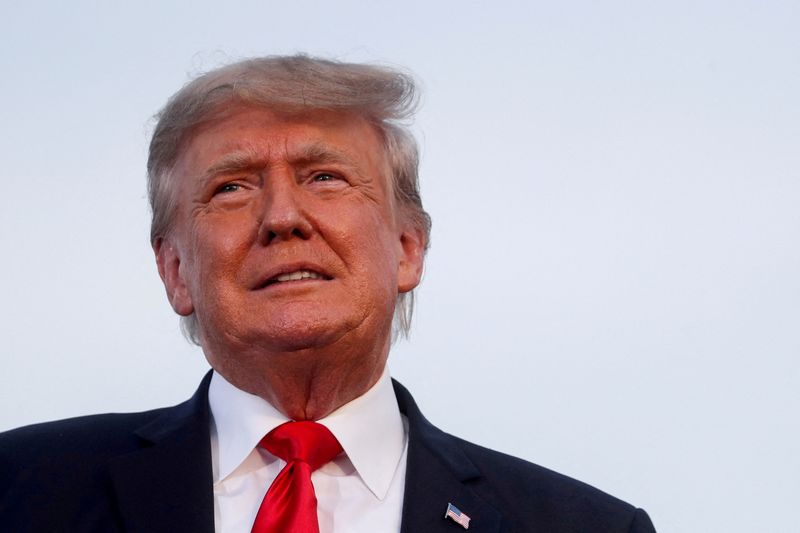By Jacqueline Thomsen and Jan Wolfe
WASHINGTON (Reuters) -Former U.S. President Donald Trump on Friday lost a bid to dismiss lawsuits accusing him of inciting the Jan. 6, 2021, attack on the U.S. Capitol.
In a lengthy written ruling https://fingfx.thomsonreuters.com/gfx/legaldocs/akpezndgovr/Mehta%20order%20Jan%206%202022.pdf, Judge Amit Mehta of the U.S. District Court for the District of Columbia said three lawsuits by Democratic members of Congress and two police officers could proceed toward trial.
Mehta agreed to dismiss Trump adviser Rudy Giuliani and Trump's eldest son Donald Trump Jr., who were named as co-defendants, from the lawsuits.
Looming large in the litigation is a Supreme Court case from 1982 holding that presidents are shielded, or immune, from lawsuits over their official acts.
Mehta ruled Trump was not immune from the lawsuits, determining that the then-president's fiery speech before the Capitol attack was not within the scope of his official presidential duties.
"To deny a President immunity from civil damages is no small step. The court well understands the gravity of its decision," Mehta ruled. "But the alleged facts of this case are without precedent, and the court believes that its decision is consistent with the purposes behind such immunity."
Jesse Binnall, a lawyer for Trump, did not immediately respond to a request for comment.
Trump and his co-defendants have argued that their remarks preceding the Jan. 6 attack were free speech protected by the U.S. Constitution.
The Democratic lawmakers, including U.S. representatives Eric Swalwell and Jerry Nadler, have invoked an 1871 law passed to fight the white supremacist Ku Klux Klan that prohibits political intimidation.
The lawsuits alleged a conspiracy between Trump and rioters to halt Congress's certification of President Joe Biden's election victory.
Without ruling on the merits of that theory, Mehta said the allegation was sufficiently detailed to proceed toward discovery, a process in which litigants exchange evidence and take testimony.

"From these alleged facts, it is at least plausible to infer that, when he called on rally-goers to march to the Capitol, the President did so with the goal of disrupting lawmakers’ efforts to certify the Electoral College votes," Mehta wrote.
Joseph Sellers, an attorney representing the Democratic lawmakers, said the ruling breaks new legal ground and "demonstrates the extraordinary nature of the conduct of which then-President Trump was engaged."